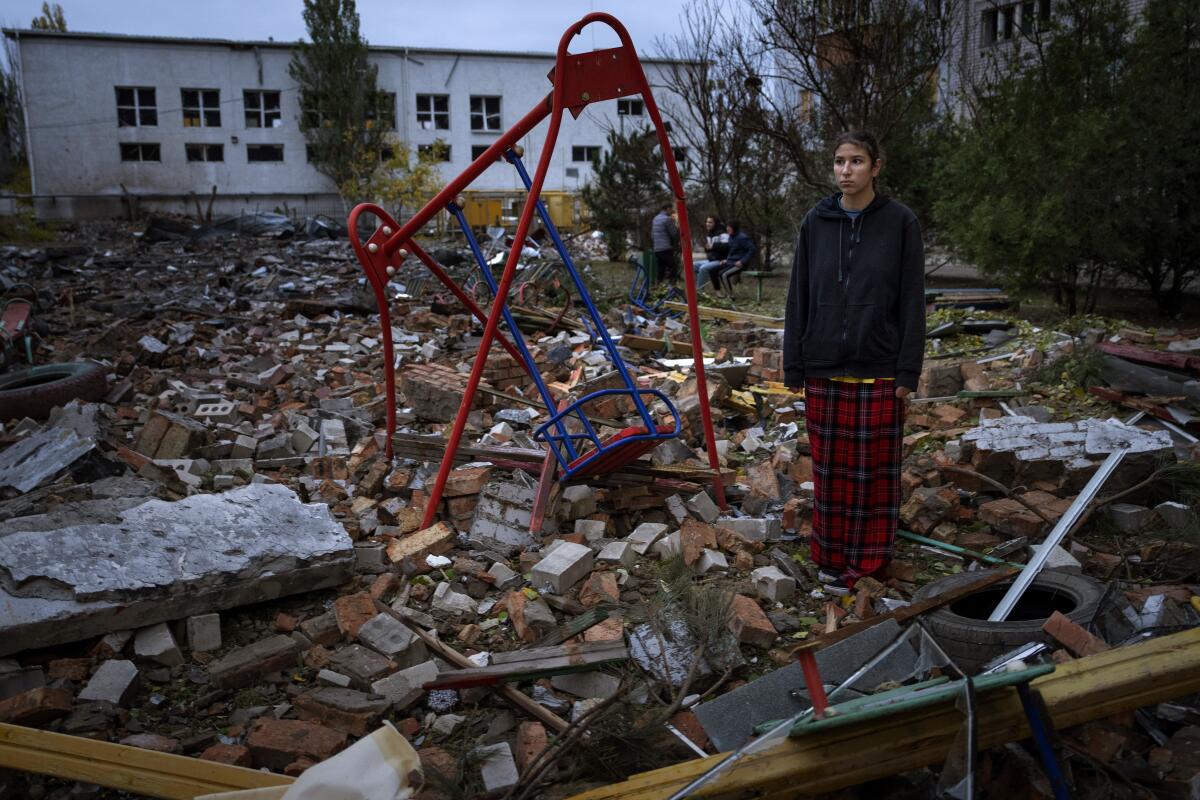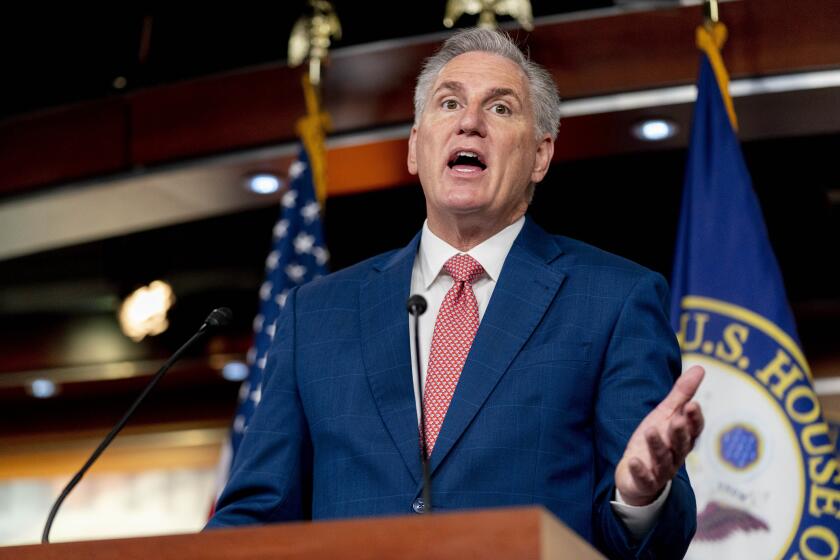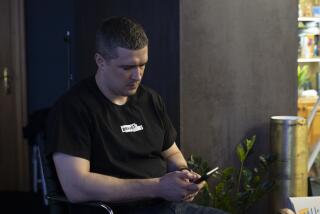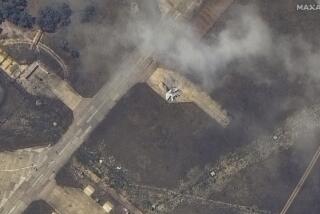Russia’s defense chief claims Ukraine may be preparing ‘dirty bomb’

- Share via
KYIV, Ukraine — Russia’s defense chief on Sunday alleged that Ukraine was preparing a “provocation” involving a radioactive device, a stark claim that was strongly rejected by U.S., British and Ukrainian officials amid soaring tensions as Moscow struggles to stem Ukrainian advances in the south.
Russia’s Defense Minister Sergei Shoigu made the allegations in phone calls with his counterparts from the United States, Britain, France and Turkey.
Russia’s Defense Ministry said Shoigu voiced concern about “possible Ukrainian provocations involving a ‘dirty bomb,’” a device that uses explosives to scatter radioactive waste. It doesn’t have the devastating effect of a nuclear explosion, but it could expose broad areas to radioactive contamination.
Russian authorities repeatedly have made allegations that Ukraine could detonate a dirty bomb in a false flag attack and blame it on Moscow, which launched its unprovoked invasion of Ukraine eight months ago Monday. Ukrainian authorities, in turn, have accused the Kremlin of hatching such a plan.
Skepticism about U.S. support for Ukraine is spreading from the GOP’s nationalist fringe to the party’s mainstream.
British Defense Secretary Ben Wallace strongly rejected Shoigu’s claim and warned Moscow against using it as a pretext for escalation.
The British Ministry of Defense noted that Shoigu in a call with Wallace “alleged that Ukraine was planning actions facilitated by Western countries, including the UK, to escalate the conflict in Ukraine.”
“The Defense Secretary refuted these claims and cautioned that such allegations should not be used as a pretext for greater escalation,” the ministry said. “The Defense Secretary also reiterated UK and wider international support for Ukraine and desire to de-escalate this conflict.”
The U.S. also rejected Shoigu’s “transparently false allegations,” White House National Security Council spokesperson Adrienne Watson said in a statement. “The world would see through any attempt to use this allegation as a pretext for escalation.”
In a televised address Sunday evening, Ukrainian President Volodymyr Zelensky suggested that Moscow itself was setting the stage for deploying a radioactive device on Ukrainian soil.
“If Russia calls and says that Ukraine is allegedly preparing something, it means only one thing: that Russia has already prepared all of it,” Zelensky said.
The French Ministry of the Armed Forces said that Shoigu told his counterpart, Sebastien Lecornu, that the situation in Ukraine was rapidly worsening and “trending towards uncontrollable escalation.”
Shoigu’s call with U.S. Secretary of Defense Lloyd J. Austin III was the second in three days. A U.S. official familiar with the Sunday call said that Russian allegations of a Ukraine provocation came up. The official spoke on condition of anonymity to discuss a private call.
The mention of the dirty bomb threat in Shoigu’s calls with his counterparts seemed to indicate the threat of such an attack has risen to an unprecedented level.
“It appears that there is a shared feeling that the tensions have approached the level that could raise the real threat for all,” Fyodor Lukyanov, the Kremlin-connected head of the Council for Foreign and Defense policies, a Moscow-based group of top foreign affairs experts, said in a commentary on Shoigu’s phone calls.
Elsewhere, Russian authorities reported that they are building defensive positions in occupied areas of Ukraine and border regions of Russia, reflecting fears that Ukrainian forces may attack along new sections of the 620-mile front line of the war.
In recent weeks, Ukraine has focused its counteroffensive mostly on the Kherson region. Their relentless artillery strikes cut the main crossings across the Dnieper River, which bisects the southern region, leaving Russian troops on the west bank short of supplies and vulnerable to encirclement.
Kirill Stremousov, the deputy head of the Russian-installed regional administration in Kherson, said Sunday in a radio interview that Russian defensive lines “have been reinforced and the situation has remained stable” since local officials strongly encouraged all residents of the region’s capital and nearby areas Saturday to evacuate by ferry to the river’s east bank.
The region is one of four that Russian President Vladimir Putin illegally annexed last month and put under Russian martial law last week. Kherson city has been in Russian hands since the early days of the war, but Ukraine’s forces have made advances toward reclaiming it.
About 20,000 Kherson residents have moved to places on the east bank of the Dnieper River, the Kremlin-backed regional administration reported. The Ukrainian military said Sunday that Russia’s military also withdrew its officers from areas on the west bank, leaving newly mobilized, inexperienced forces.
The Ukrainian claim could not be independently verified.
As Ukraine presses south after liberating the Kharkiv region in the north last month, authorities in the western Russian provinces bordering northeastern Ukraine appeared jittery.
The governor of Russia’s Kursk region, Roman Starovoit, said Sunday that two defensive lines have been built and a third one would be finished by Nov. 5.
Defensive lines were also established in the Belgorod region, Gov. Vyacheslav Gladkov said. He posted pictures Saturday of lines of pyramid-shaped concrete blocks to block the movement of armored vehicles.
More defensive positions are being built in the Luhansk region of eastern Ukraine, according to an announcement by Yevgeny Prigozhin, a millionaire Russian businessman dubbed “Putin’s chef.” Prigozhin owns the Wagner Group, a mercenary military company that has played a prominent role in the war.
He said his company was constructing a “Wagner line” in the Luhansk region, another of the Ukrainian provinces Putin illegally annexed last month. Prigozhin posted images Wednesday showing a section of newly built defenses and trench systems southeast of the town of Kreminna.
The British Defense Ministry said Sunday that “the project suggests Russia is making a significant effort to prepare defenses in depth behind the current front line, likely to deter any rapid Ukrainian counteroffensives.”
Russia’s forces captured Luhansk several months ago. Pro-Moscow separatists declared independent republics in the region and neighboring Donetsk eight years ago, and Putin made controlling all of both provinces a goal at the war’s outset.
The Institute for the Study of War, a think tank in Washington, said Sunday that Russia’s latest strategy of targeting power plants appeared aimed at diminishing Ukrainians’ will to fight and forcing the government in Kyiv to devote more resources to protecting civilians and energy infrastructure.
It said the effort was unlikely to damage Ukrainian morale but would have significant economic impacts.
Nine regions across Ukraine, from Odesa in the southwest to Kharkiv in the northeast, saw more attacks targeting energy and other critical infrastructure over the last day, the Ukrainian army’s general staff said. It reported a total of 25 Russian airstrikes and more than 100 missile and artillery strikes around Ukraine.
The Russian attacks forced the emergency suspension of fertilizer production at a major chemical plant in northwestern Ukraine. The company that operates the plant, Rivneazot, said Sunday that the suspension did not pose an environmental risk.
Russian S-300 missile strikes overnight hit a residential neighborhood in the city of Mykolaiv, injuring three people, according to the Ukrainian military’s southern command. Two apartment buildings, a playground and a warehouse were damaged or destroyed, it said in a Facebook post.
More to Read
Sign up for Essential California
The most important California stories and recommendations in your inbox every morning.
You may occasionally receive promotional content from the Los Angeles Times.











